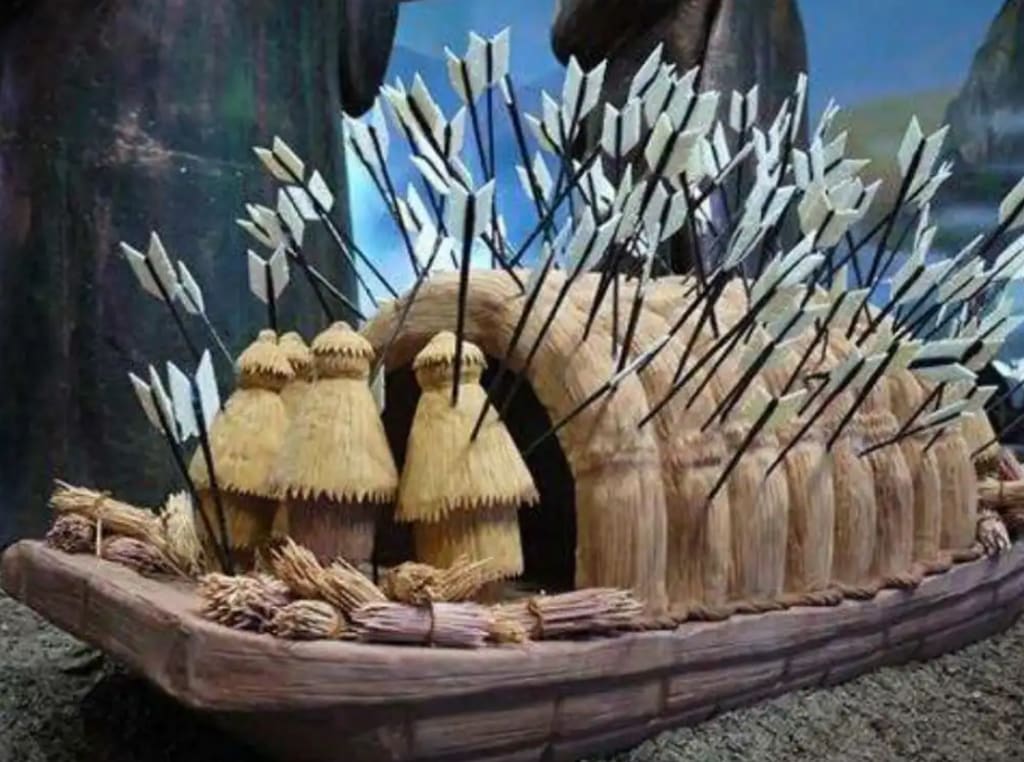
The Three Kingdoms period (220-280 AD) was a time of great turmoil and conflict in China. During this period, the country was divided into three separate kingdoms: Wei, Shu, and Wu. These kingdoms were constantly at war with each other, vying for power and control. One famous tale from this period is the story of "Borrowing a Sword with a Grass Boat", which is a classic example of using deception and trickery in warfare.
Background
During the Three Kingdoms period, military strategy played an important role in determining the outcome of battles. Generals had to be strategic and cunning in order to gain an advantage over their enemies. The story of "Borrowing a Sword with a Grass Boat" takes place during a battle between the kingdoms of Wei and Wu.
The Story
The general of the Wu army, Zhou Yu, realized that his army was outmatched by the Wei army's superior weaponry. He needed to find a way to even the odds. Zhou Yu was a brilliant strategist and came up with a plan to borrow a sword from the enemy.
He knew that the Wei general, Cao Cao, was a proud man who would not easily give up his weapons. Zhou Yu decided to use Cao Cao's pride to his advantage. He sent one of his best warriors, Huang Gai, to sail towards the Wei camp in a small grass boat. On the boat, Huang Gai carried only a letter and a small gift for Cao Cao.
When he arrived at the Wei camp, he presented the letter and gift to Cao Cao, who was suspicious of the gesture. Huang Gai explained that he had come to surrender and hoped that Cao Cao would accept his gift as a sign of goodwill. Cao Cao was pleased with the gift but still hesitant to trust Huang Gai. However, he allowed him to return to his own camp unharmed.
When Huang Gai returned to the Wu camp, Zhou Yu instructed him to soak the grass boat in oil and fill it with straw and other inflammable materials. He then ordered his soldiers to prepare for a surprise attack on the Wei camp.
That night, as Cao Cao was inspecting Huang Gai's gift, he noticed that the grass boat was floating towards his camp. He recognized it as the same boat from earlier and assumed it was another surrender attempt. However, when his soldiers tried to bring the boat ashore, it burst into flames, revealing the fiery straw and oil inside. The Wu army had hidden behind the smoke and fire and launched a surprise attack on the Wei camp, catching them off guard.
The Significance
The story of "Borrowing a Sword with a Grass Boat" is a classic example of using deception and trickery in warfare. Zhou Yu's plan to borrow a sword from the enemy was creative and cunning, and it ultimately led to his victory over the Wei army.
This story has become a popular cultural reference in China, and the phrase "Borrowing a Sword with a Grass Boat" is often used to describe situations where someone is able to achieve success by using unexpected means.
Conclusion
The story of "Borrowing a Sword with a Grass Boat" is a timeless tale of wit and cunning that has inspired people for centuries. It reminds us that even in the face of overwhelming odds, there is always a way to turn the tide of battle through clever thinking and resourcefulness.
Zhou Yu's plan to borrow a sword from the enemy was an example of how intelligence and strategic thinking can be used to achieve victory. This story continues to inspire people in China and around the world, and the phrase "Borrowing a Sword with a Grass Boat" remains a symbol of ingenuity and resourcefulness.





Comments
There are no comments for this story
Be the first to respond and start the conversation.